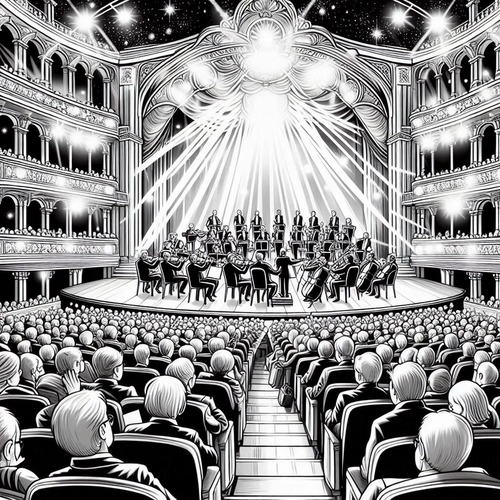Arguments for the Existence of God: Aquinas’ Timeless Quintuple
Aquinas’ Five Arguments for the Existence of God
Have you ever gazed at the beauty of the world around you, and said to yourself, surely there’s more to the universe than meets the eye?
In our exploration of classical apologetics, we turn to one of the most influential thinkers in Christian philosophy, Thomas Aquinas, and his renowned Quinque Viae, or Five Ways. These five ways, presented in his seminal work, Summa Theologica, offer rational arguments for the existence of God. Despite being formulated in the 13th century, these arguments remain profoundly relevant even in contemporary discussions about God.
- The Unmoved Mover: The Universe Needs a First Push Imagine the universe as a grand ballet—planets pirouette, stars twinkle, and galaxies waltz across the cosmic stage. Yet, Aquinas argues, every dance requires a choreographer. In other words, Aquinas starts with the observation that everything in the world is in motion. He posits anything in motion must have been set in motion by something else. This chain of motion cannot regress infinitely, leading to the necessity of a Prime Mover, an Unmoved Mover—God. Modern Relevance: In today’s scientific context, where the Big Bang Theory suggests a singular beginning of the universe, the concept of a Prime Mover is compelling. It aligns with the need for an initial cause for the universe’s existence and expansion, appealing to both physics and metaphysics that seek to understand the origins of motion and change in the cosmos.
- The First Cause: Every Domino Needs a Push to Start Cause and effect are the building blocks of our reality. A billiard ball strikes another, a domino topples its neighbour. Aquinas argues every effect has a cause, and there cannot be an infinite regress of causes. Therefore, there must be an Uncaused Cause, a first cause that is not itself caused by anything else. This Uncaused Cause is what we understand as God. Modern Relevance: This argument resonates with contemporary discussions on the cosmological principle, which seeks to understand the cause behind the universe’s existence. The principle of sufficient reason supports the need for an ultimate cause that can account for the existence of everything we observe.
- The Necessary Being: The Anchor in a Sea of Change Our world is filled with impermanence—flowers bloom and wither, empires rise and fall. But Aquinas proposes the necessity of a being whose essence is existence itself, a being not contingent on external factors. This self-sufficient and necessary being, he suggests, is God—the immutable cornerstone that anchors all of existence. Aquinas observes things in the universe come into being and pass away, indicating their existence is not necessary. If everything were contingent, there could have been a time when nothing existed. But since something exists now, there must be a necessary being that has always existed, which is God. Modern Relevance: The argument from contingency addresses the fundamental question of why there is something rather than nothing. It provides a framework for understanding the existence of the universe and its dependency on a necessary being, which many argue is more philosophically robust than atheistic alternatives.
- The Degrees of Perfection: A Scale Leading to the Ultimate Good Look around you—there are varying degrees of beauty, intelligence, and virtue in the natural world. A rose may be considered beautiful, but the human mind possesses a different kind of grandeur. Aquinas proposes a hierarchy of perfection, with an ultimate peak representing the embodiment of all that is good and true. This pinnacle of perfection, he argues, is God—the source and standard for all excellence. Modern Relevance: This argument engages with the concept of objective morality and the existence of absolute values. In a world grappling with moral relativism, the idea of a maximal being who is the source of all goodness offers a grounding for universal moral truths.
- The Teleological Argument: Design Hints at a Designer From the intricate double-helix of DNA to the synchronized movements of planets, the universe displays a remarkable level of design and purpose. Aquinas reasons that such intricate complexity necessitates a designer of supreme intelligence. This mastermind behind the universe’s grand plan, he suggests, is God—the divine architect orchestrating the symphony of existence. Aquinas adds even natural bodies work towards a purpose, a design that is evident even in things that lack intelligence. This mastermind behind the universe’s grand plan, he suggests, is God—the divine architect orchestrating the symphony of existence. Modern Relevance: The argument from design or teleology finds a contemporary echo in the intelligent design movement and the fine-tuning argument, which point to the precise conditions necessary for life. These modern interpretations suggest that the complexity and order in the universe are best explained by an intelligent cause.
Why the Quintuple Arguments for the Existence of God Deserve Our Attention Today
In a world increasingly dominated by scientific materialism and existential uncertainty, Aquinas’s five arguments for the existence of God offer a robust intellectual framework for theistic belief. They provide compelling philosophical underpinnings for faith, bridging the gap between reason and belief.
Philosophical Rigour: Each of Aquinas’s ways is built upon logical and empirical observations, making them timeless tools in philosophical and theological discourse. They continue to challenge both theists and atheists to think deeply about the fundamental nature of reality.
Interdisciplinary Relevance: The arguments touch on various disciplines, from metaphysics and cosmology to ethics and biology. They provide a coherent narrative that resonates with scientific discoveries and philosophical inquiries, demonstrating the complementarity of faith and reason.
Existential Relevance: In an age of skepticism and relativism, the Quinque Viae offer a sense of certainty and purpose. They point to a transcendent source of meaning and order, providing a foundation for understanding our place in the universe.
Engagement with Modern Thought: These arguments remain relevant in contemporary debates on cosmology, morality, and the origins of life. They engage with and often anticipate questions that modern science and philosophy continue to explore.
Conclusion
Thomas Aquinas’s Quinque Viae, are not merely relics of medieval thought but dynamic, enduring arguments for the existence of God. They challenge us to consider the ultimate causes and purposes behind the universe and our own existence. By engaging with these arguments, we can deepen our understanding of God, enrich our faith, and navigate the complexities of modern intellectual life with confidence and clarity.
Related Reads:
- The Ontological Argument: Can We ‘Logic’ Our Way to God?
- The Universal Moral Oughts: Signposts to the Divine
- The Kalam Cosmological Argument: A Quest for Cosmic Beginnings
- The Teleological Argument: Unveiling Design in a Universe of Wonder
- The Fine-Tuning Argument: Can Orchestras Compose and Conduct Themselves?
Editor's Pick

Why Do People Hate the Doctrine of Election?
…WHEN THEY REALLY SHOULDN’T Few Bible doctrines provoke stronger reactions than election. The idea that God chose some for salvation [...]

The Doctrine of Providence: Does God Really Govern All Things?
You’re sitting in the doctor’s office when the diagnosis lands like a thunderclap. Your mind races: Why this? Why now? [...]

No Decay, No Defeat: What It Means That Christ’s Body Saw No Corruption
On the Day of Pentecost, Peter stood before thousands and made a startling claim: David's body decayed in the tomb, [...]
SUPPORT US:
Feel the Holy Spirit's gentle nudge to partner with us?
Donate Online:
Account Name: TRUTHS TO DIE FOR FOUNDATION
Account Number: 10243565459
Bank IFSC: IDFB0043391
Bank Name: IDFC FIRST BANK






